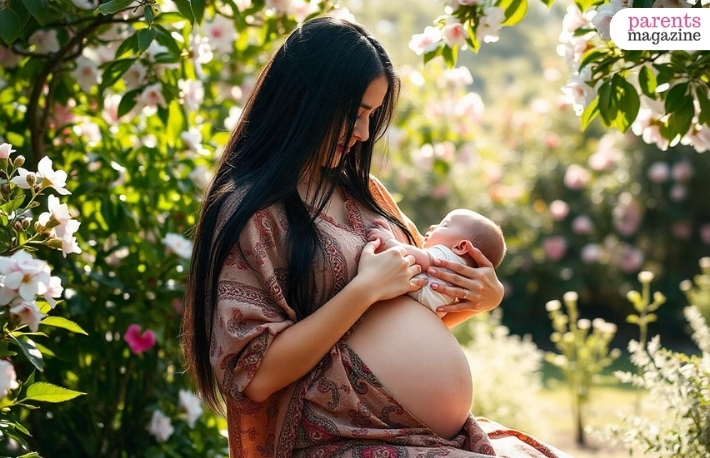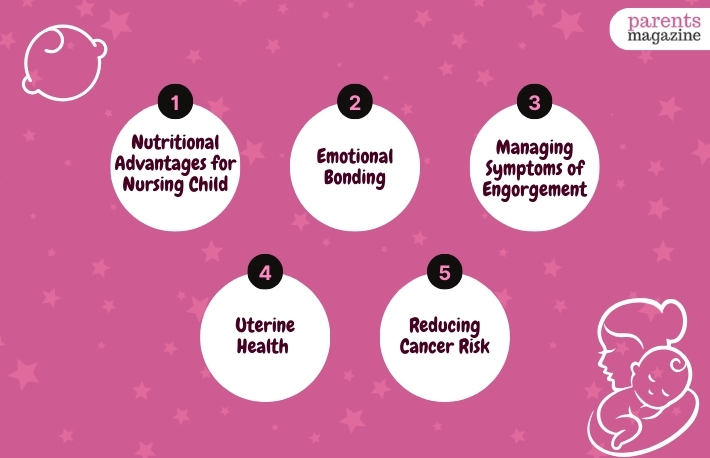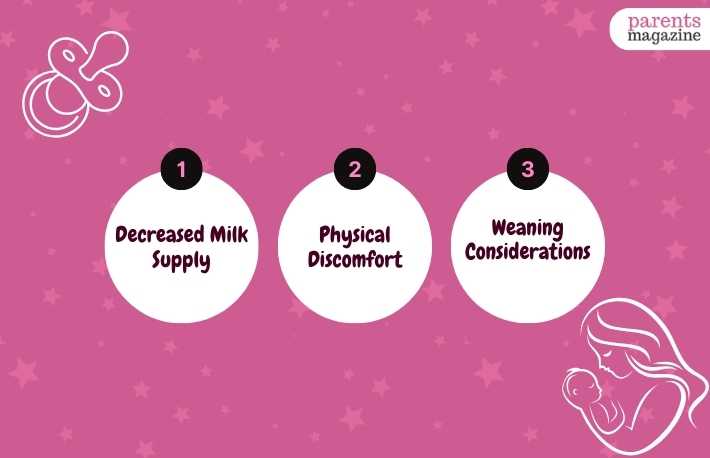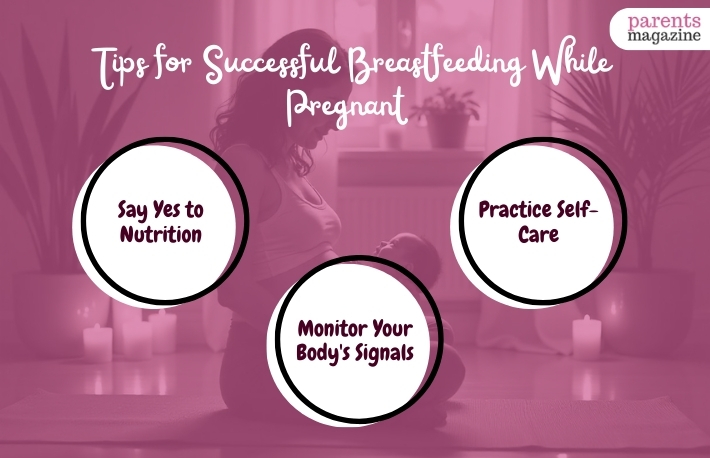
Breastfeeding While Pregnant: All You Need to Know
Breastfeeding is a beautiful and natural way to nourish your child, but what about having one child already breastfeeding and you are pregnant – again?
Breastfeeding while pregnant is quite tricky.
This is a situation that can be emotionally and physically exhausting. As a pregnant mom, you might have lots of confusion, questions, and queries. Is it safe? Does it affect your breast milk supply?
What about tandem breastfeeding? Do you have to breastfeed both children at some point? It’s common to find yourself amid all these questions. But not to worry. This article serves as a guide to help you solve all your queries regarding breastfeeding when you are pregnant. Keep reading.
Is It Safe?
The short answer is yes — you can breastfeed during pregnancy without affecting the health of your unborn child and the nursing baby. But this applies to women with uncomplicated pregnancies.
According to the American Academy of Family Physicians, women can breastfeed without complications or adverse effects. Also, a lactating mom must have proper nutrition, diet, and fluid intake to ensure perfect health.
There are some mild issues they must be aware of, such as – uterine contractions, milk supply, fatigue, nipple soreness, nausea, etc. If there are any pregnancy complications or other health issues, they must consult with their healthcare provider.
Hormonal Changes and Their Effects

Breastfeeding is fine during pregnancy. But how that will affect your body is also a matter of question.
During pregnancy, the female body goes through various changes, and shifts in hormonal balance are quite common. Changes in pregnancy-related hormones can lead to a decrease in milk supply. It usually happens around the fourth or the fifth month of your pregnancy.
Additionally, these changes may lead to older breastfeeding toddlers starting to wean. If you want your toddler to feed themselves, this can also be an opportunity to start. But, for the time being, there are certain benefits your body can enjoy during pregnancy.
Advantages & Disadvantages of Breastfeeding While Pregnant

There are some advantages and disadvantages of breastfeeding during pregnancy. Following are some explanations of both –
Breastfeeding While Pregnant: Benefits

Breastfeeding during pregnancy helps the mom and the toddler. Here are several benefits you must be aware of when you are breastfeeding your baby during pregnancy –
Nutritional Advantages for Nursing Child
There are different nutritional benefits of breastfeeding during pregnancy. It’s essentially beneficial for the older child. Breastmilk has the necessary nutrients and antibodies to support the growth of their baby’s immune system.
However, this only applies when your older toddler still gets most of their nutrients from breastmilk. It needs to be a significant portion of the source of nutrition your toddler relies on.
Emotional Bonding
During pregnancy, it’s difficult to maintain connections and bonding with your older toddler. But breastfeeding gives moms and older toddlers the perfect opportunity to bond. It helps the mother, and the toddler adjust to the following changes in the family dynamic.
The toddler doesn’t feel left out because the mother’s pregnant, and the mother doesn’t have to exhaust herself, reassuring her love for the toddler.
Managing Symptoms of Engorgement
During pregnancy, women face certain discomforts related to engorgement. It only gets worse as they start to approach their Labor Day and prepare for childbirth. But nursing helps alleviate this discomfort in pregnant moms.
It also helps adjust their breasts and readies them for nursing. Later, when you must nurse both children, you won’t have too much discomfort if the older toddler is still breastfeeding.
Uterine Health
Breastfeeding triggers the release of oxytocin, which helps your uterus return to its standard size more quickly. This can result in less bleeding after childbirth.
Reducing Cancer Risk
Breastfeeding is a practice that helps reduce the risk of breast cancer. It can reduce the chances of cervical cancer, and ovarian, and uterine cancer, as claimed by many health experts.
Breastfeeding While Pregnant: Challenges

Although breastfeeding during pregnancy is beneficial at large, there are some challenges to know about
Decreased Milk Supply
When breastfeeding during pregnancy, mothers can often notice a fall in milk supply in their breasts. This happens due to hormonal changes during pregnancy. Usually, women face this during the second trimester.
An easy way to spot this is to see if your older toddler is nursing less frequently. Also, if they are unsatisfied after feeding, your breasts aren’t producing enough milk.
Physical Discomfort
Pregnancy can bring physical discomfort, like breast fatigue, making it challenging for moms to continue feeding. It’s common for many women to experience nipple soreness during their early pregnancy because of shifts in their hormonal levels.
However, listening to your body and taking breaks if needed is essential. You might also consider shortening feeding sessions or adjusting positions for comfort.
Weaning Considerations
It’s ok if your body is not giving enough. If your toddler doesn’t any longer like the taste of breastmilk or needs more to get enough nutrition, consider weaning.
You can try baby-led weaning. Breastfeeding throughout pregnancy is hectic. If you are tired, you can start by introducing solid foods to your toddler.
Stop Breastfeeding, Start Weaning

While many mothers successfully breastfeed throughout their pregnancies without complications, there are specific situations where weaning may be advisable:
- High-Risk Pregnancy: Do you have a history of miscarriage or premature birth? In that case, it’s best to reconsider the option of breastfeeding while pregnant. But, if you want to move ahead, do so after consulting your doctor.
- Severe Fatigue: There are several discomforting symptoms of pregnancy. One of them is severe fatigue. If your fatigue is growing worse while breastfeeding during pregnancy, opt for weaning your toddler instead.
- Uterine Contractions: Breastfeeding releases oxytocin. It’s something that stimulates uterine contractions. This is usually harmless in pregnancies that aren’t complicated. However, make it a habit to monitor any unusual contractions or discomfort if you are breastfeeding during pregnancy.
These are some of the scenarios under which you can start weaning your older toddler. Ensure you try healthy and easy-to-digest weaning recipes for your little one when planning to start weaning.
Tips for Successful Breastfeeding While Pregnant

Now, if you decide to breastfeed during pregnancy (after consulting your doctor, of course), follow these tips to stay on the safer side –
Say Yes to Nutrition
Does your older toddler rely on your breastmilk for a huge part of their daily nutrition? In that case, make sure to consume at least 150 to 500 calories (about 40 minutes of running) of food daily.
Your body needs the energy and nutrition to produce extra for your toddler. This additional energy will support not only your toddler but also the health of the fetus.
Practice Self-Care
Breastfeeding while pregnant is like juggling two significant responsibilities that seem like two different worlds. Make sure to rest when you can. If you must nap, don’t stay up.
Make the most of the time you have free from your toddler. If there are other household responsibilities you are struggling to juggle, ask other family members to help.
Monitor Your Body’s Signals
Adjust feeding time when you experience any changes or discomfort. Shortening feeding sessions and changing position while feeding might also help. If your older toddler is still insistent on breastfeeding, communicate with them and help them move on to feeding themselves.
Tandem Nursing
If your body permits you to breastfeed your other child, then that’s wonderful. But, after childbirth, you can try tandem breastfeeding. This can be rewarding for both children. However, consult with your healthcare provider about the dos and don’ts regarding this.
Conclusion
Breastfeeding while pregnant is a personal choice. But it’s something that requires enough patience and navigating through different challenges. Starting from physical hurdles to navigating through emotional challenges, breastfeeding during this phase is difficult.
Yes, you may not be able to do it alone. It’s ok to ask for help from the other family members. If there are any other physical or pregnancy complications, consult your healthcare provider and take precautions accordingly.
Whether you should breastfeed during pregnancy or not depends on what you prefer. However, in all scenarios, make safety your top priority.
Related…
Already have an account?
Sign In
Create your account
User added successfully. Log in









